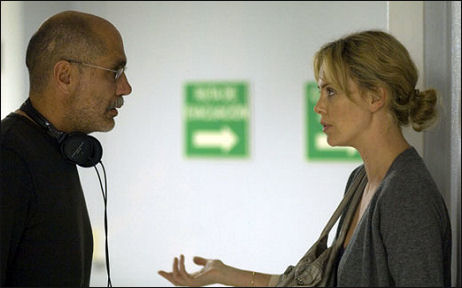“We never tell stories in a linear way — we always tell them in a decomposed way,” Guillermo Arriaga, director-writer of The Burning Plain, has told the Guardian‘s Mark Brown. “If you ask how did I become a director, I will not begin at the beginning. I will talk about my grandfather, my trip to Italy and so on. That’s the way we tell stories in real life.”
 Burning Plain director-writer Guillemo Arriaga, star Charlize Theron
Burning Plain director-writer Guillemo Arriaga, star Charlize Theron “I’ve always been driven to the desert. I think the landscape itself influences people. This movie was based on the four elements — water, earth, wind and fire — and [in] using them I wanted to explore why sometimes people are damaged.”
“Some” people? Who isn’t damaged? Who among us is unbruised or unscathed?
I remember Woody Allen‘s remark in front of a crowd at the WGA theatre during a promo tour for Match Point. I didn’t record it, but the gist was more or less as follows: “When I look at a baby girl sleeping I just feel sorry for her. I feel sad knowing what she’ll be going through. All the pain and heartbreak and hurt feelings and betrayals by boyfriends and the personal disappointments that await her. And knowing that one day she may come to feel as I do, which is that we’re living in a concentration camp and that the only way out is through the smokestacks.”
